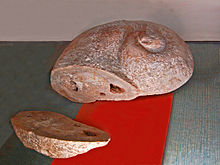Caprina
Appearance
| Caprina Temporal range: Cretaceous, [1]
| |
|---|---|

| |
| Fossil shell of Caprina adversa from France, on display at Galerie de paléontologie et d'anatomie comparée in Paris | |
| Scientific classification | |
| Domain: | Eukaryota |
| Kingdom: | Animalia |
| Phylum: | Mollusca |
| Class: | Bivalvia |
| Order: | †Hippuritida |
| Suborder: | †Hippuritidina |
| Superfamily: | †Caprinoidea |
| Family: | †Caprinidae |
| Genus: | †Caprina d'Orbigny, 1822 |
Caprina is a genus of rudists, a group of marine heterodont bivalves belonging to the family Caprinidae.[2]
These stationary intermediate-level epifaunal suspension feeders lived in the Cretaceous period, from 140.2 to 70.6 Ma.[1] The rudists became extinct at the end of the Cretaceous, apparently as a result of the Cretaceous–Paleogene extinction event.
Fossils of this genus have been found in the sediments of Europe, Japan, Cuba, Mexico and the United States.[1]
References
[edit]
